The Dangers of Working Out on Cocaine
Cocaine use during workouts poses significant dangers, including cardiovascular overload, accelerated muscle glycogen depletion, and an increased risk of sudden cardiac death. Additionally, the combination of cocaine's stimulant effects and intense physical exertion leads to neurological and systemic risks, jeopardizing both immediate and long-term health.

According to Conlee, R.K.’s 2000 study, ‘Cocaine and exercise: α-1 receptor blockade does not alter muscle glycogenolysis or blood lactacidosis.’, when combined with exercise, cocaine causes a 47% reduction in muscle glycogen and triples blood lactate concentration compared to exercise alone.
These physiological changes occur alongside a dramatic 27-fold increase in norepinephrine levels during cocaine-exercise compared to resting conditions. The study tested whether these effects resulted from blood vessel constriction through α-1 receptors, but receptor blocking did not prevent the metabolic disruptions.
This indicates that cocaine's negative impact on exercise performance stems from other physiological mechanisms not related to α-1 receptor activation.
What Are The Dangers of Cocaine While Working Out?
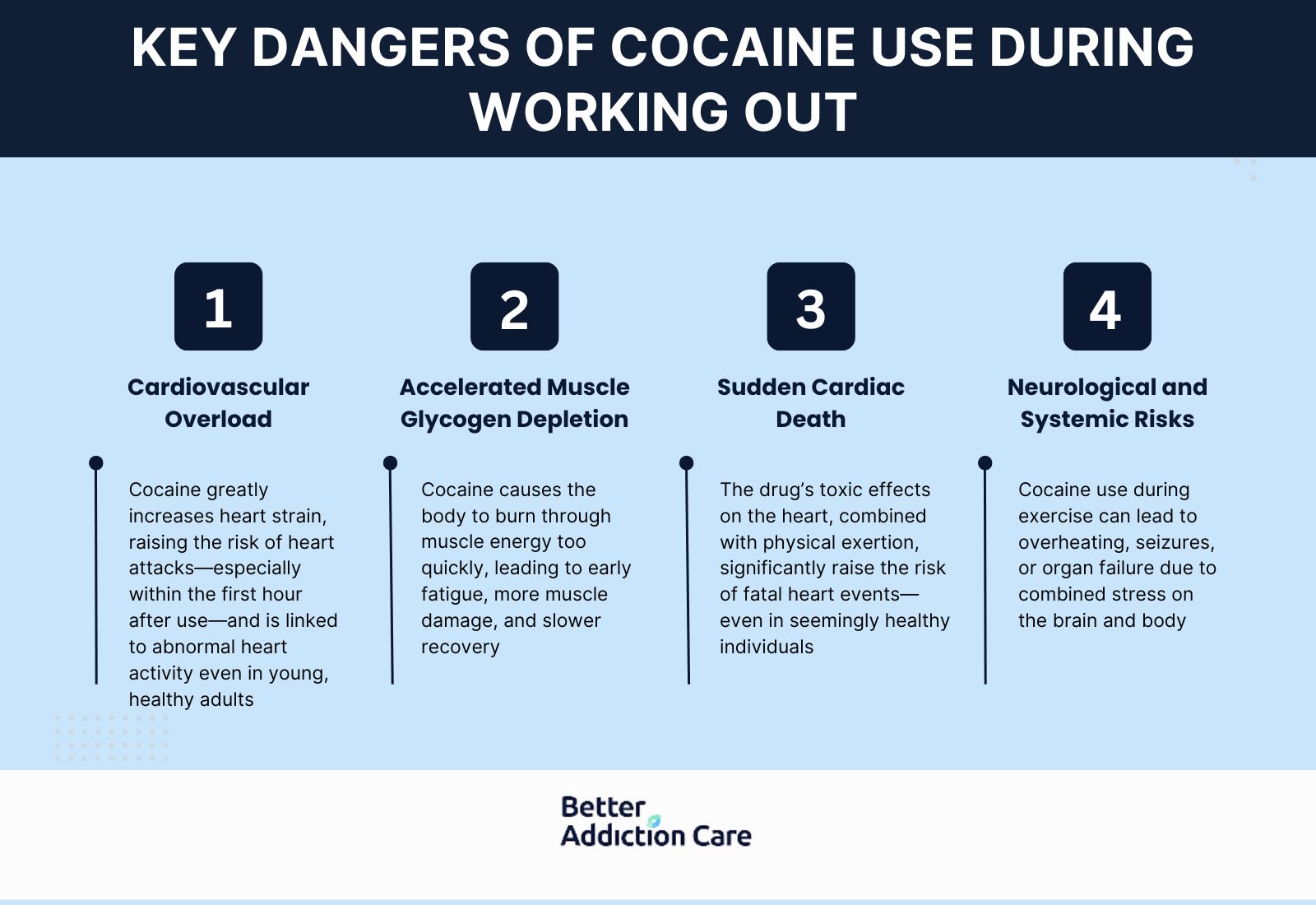
The dangers of cocaine while working out include cardiovascular overload, rapid depletion of muscle energy reserves, risk of sudden cardiac arrest, and serious neurological complications. Using this stimulant during physical activity places extreme stress on your heart, brain, and other vital systems, creating a potentially life-threatening situation.
Here are the key dangers of cocaine use during working out:
-
Cardiovascular Overload: Cardiovascular overload refers to excessive strain on the heart and blood vessels due to heightened demands. According to Schwartz, B. G.’s 2010 study, ‘Cardiovascular Effects of Cocaine’, cocaine increases the risk of myocardial infarction by 24-fold in the first hour after use. It contributes to approximately 25% of all heart attacks in adults aged 18-45. The cardiovascular impact is further evidenced by abnormal ECGs in 56-84% of cocaine users with chest pain, while 18-45% of those experiencing cocaine-induced myocardial infarction show normal coronary arteries on angiography.
-
Accelerated Muscle Glycogen Depletion: Accelerated muscle glycogen depletion is the rapid exhaustion of stored energy in muscles. Combining cocaine with exercise causes abnormal energy usage, leading to premature fatigue, increased muscle damage, and prolonged recovery times, which in turn impair overall physical performance.
-
Sudden Cardiac Death: Sudden cardiac death is an unexpected, fatal cardiovascular event triggered by extreme stress on the heart. Cocaine’s cardiotoxic effects, combined with the added exertion of working out, create a high risk of sudden cardiac arrest, even in individuals who appear physically fit.
-
Neurological and Systemic Risks: Neurological and systemic risks involve harm to the brain and other organs due to physiological stress. Cocaine’s stimulant properties, paired with intense physical activity, lead to overheating, seizures, or multi-organ failure, endangering both immediate and long-term health.
What Are The Cardiovascular Risks of Working Out on Cocaine?
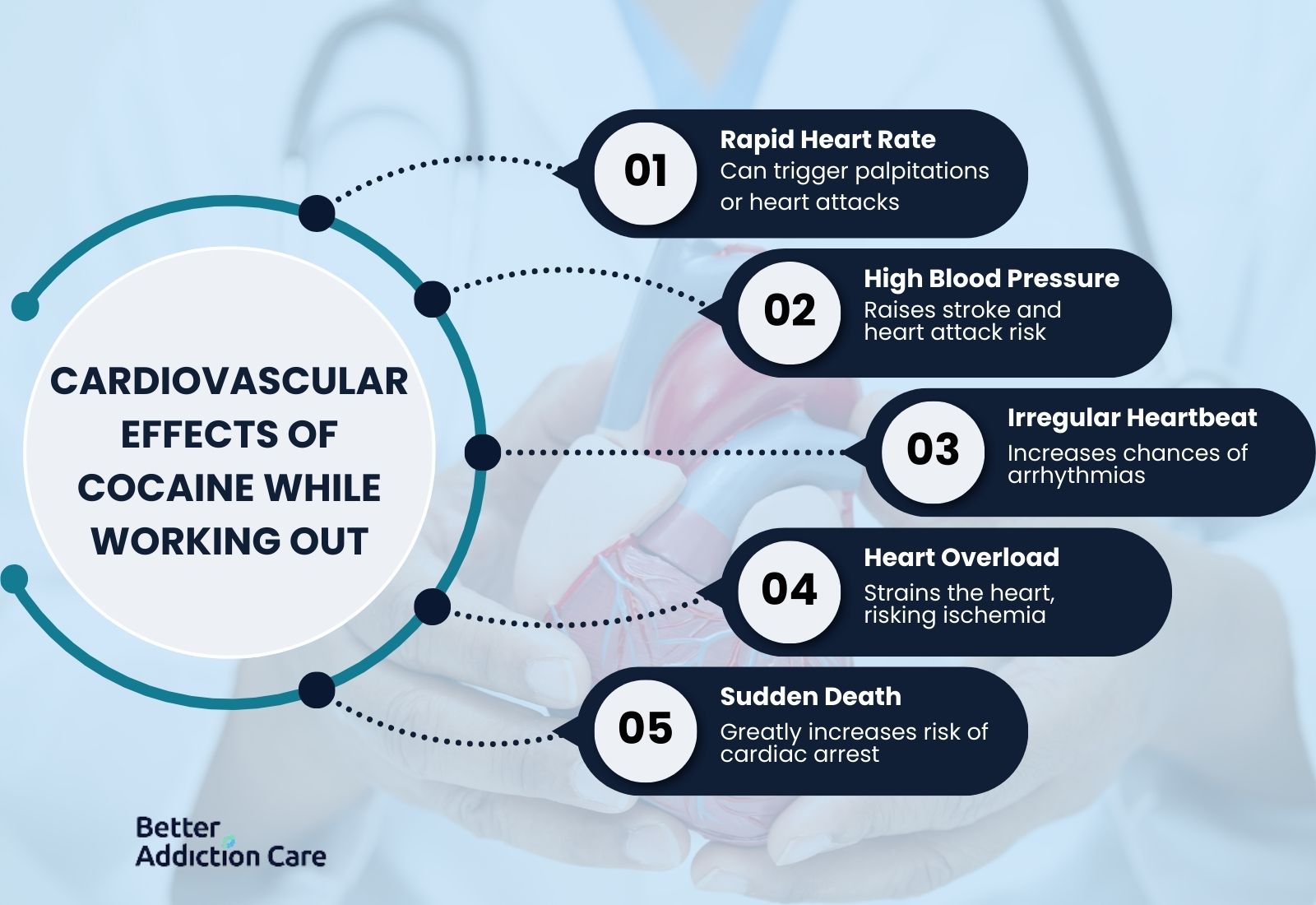
The cardiovascular risks of working out on cocaine include increased heart rate leading to dangerous palpitations, extreme blood pressure elevation, development of potentially fatal arrhythmias, excessive cardiac strain, and heightened risk of sudden cardiac arrest.
Here are some potential cardiovascular effects of cocaine while working out:
-
Increased Heart Rate: Cocaine activates the sympathetic nervous system, leading to a rapid rise in heart rate. Exercise further elevates heart rate, resulting in dangerously high levels that cause palpitations, arrhythmias, and heart attacks.
-
Elevated Blood Pressure: Cocaine induces vasoconstriction, narrows blood vessels, and raises blood pressure. Exercise temporarily increases blood pressure, and the combination of cocaine and exercise results in extreme hypertension, increasing the likelihood of stroke, heart attack, and other cardiovascular complications.
-
Cardiac Arrhythmias: Cocaine disrupts normal heart rhythms, causing conditions like atrial fibrillation and ventricular tachycardia. Intense physical activity also triggers arrhythmias, especially in individuals with underlying heart conditions.
-
Increased Cardiac Workload: Cocaine increases cardiac strain by forcing the heart to pump more blood. Exercise adds further demand as the heart supplies oxygen-rich blood to active muscles. Combining cocaine with exercise overburdens the heart, potentially causing myocardial ischemia or a heart attack.
-
Risk of Sudden Cardiac Arrest: Cocaine use during exercise significantly heightens the likelihood of abrupt cardiac events, including sudden cardiac arrest. According to Kim, S. T.’s 2019 study, ‘Acute and Chronic Effects of Cocaine on Cardiovascular Health’, cocaine-induced cardiotoxicity results in sudden death through multiple pathophysiological mechanisms. Approximately 40% of all emergency department visits related to drug misuse and abuse were attributed to cocaine.
How Does Cocaine Affect Overexertion?
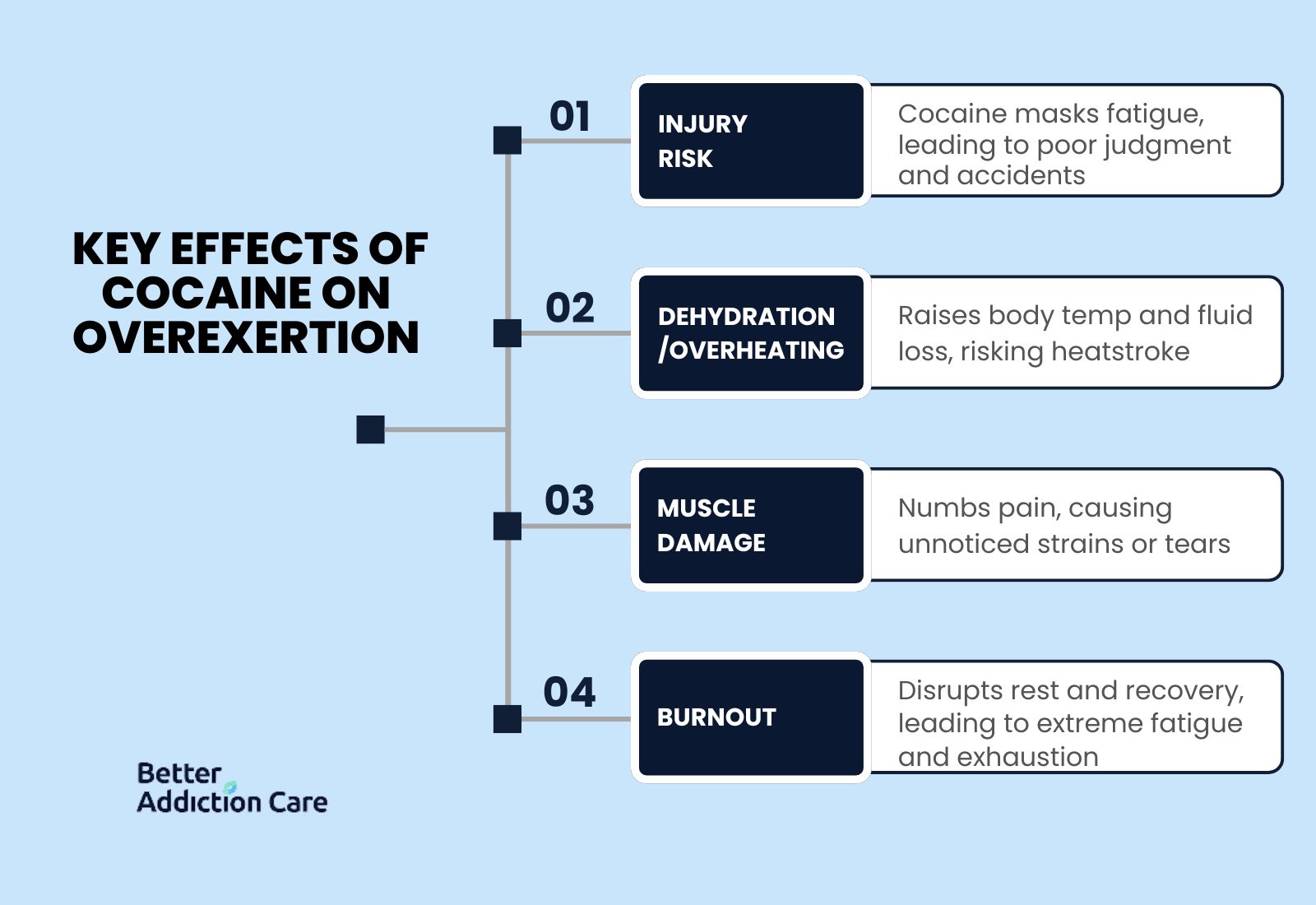
Cocaine affects overexertion by increasing injury risk due to false impressions of invincibility, causing dehydration and overheating through elevated body temperature, leading to musculoskeletal damage when pain signals are masked, and accelerating exhaustion and burnout.
Here are the key effects of cocaine on overexertion:
-
Increased Risk of Injury: Cocaine creates a false sense of vitality and invincibility, leading individuals to exceed physical limits. Ignoring fatigue impairs judgment and coordination, resulting in accidents, falls, and injuries during exercise.
-
Dehydration and Overheating: Cocaine raises body temperature and increases sweating, causing dehydration and electrolyte imbalance. Overexertion without adequate hydration exacerbates these effects, leading to heat exhaustion or heatstroke, particularly in hot environments.
-
Musculoskeletal Damage: Pushing the body beyond its limits while ignoring fatigue causes strains, sprains, or tears. Cocaine’s numbing effects mask pain, leaving individuals unaware of injury severity and delaying medical attention.
-
Exhaustion and Burnout: Overexertion and neglecting fatigue lead to physical and mental depletion, burnout, and chronic fatigue syndrome. Cocaine disrupts sleep cycles and hinders the body’s recovery processes, worsening these outcomes.
What Are the Brain Effects of Working Out on Cocaine?
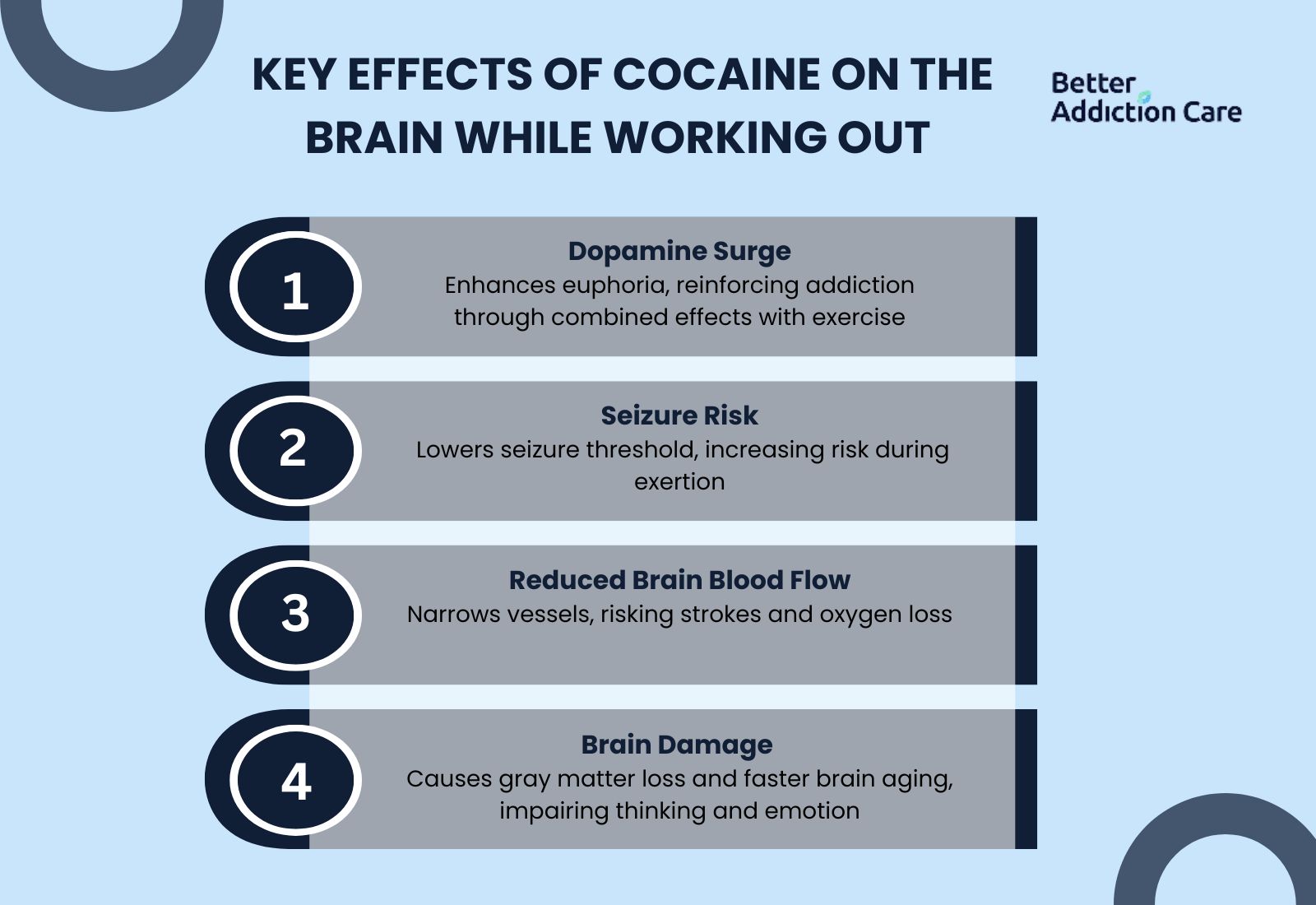
The brain effects of working out on cocaine include dangerous dopamine amplification, heightened seizure vulnerability, restricted blood flow to brain tissues, and potential long-term neural damage. Exercise naturally produces endorphins, which, when combined with cocaine's impact on neurotransmitters, create particularly risky conditions for your brain health.
Here are the key effects of cocaine on the brain while working out:
-
Increased Dopamine Levels: Cocaine inhibits dopamine reuptake, elevating neurotransmitter levels in the brain's reward pathways. This surge intensifies feelings of euphoria and pleasure. When combined with exercise-induced endorphins, the effect amplifies satisfaction and reinforces addictive behaviors.
-
Increased Seizure Risk: Cocaine lowers the seizure threshold, heightening the likelihood of seizures during exercise, particularly during acute intoxication or withdrawal. Neurotransmitter imbalances, neural hyperexcitability, and altered brainwave activity contribute to seizure occurrence.
-
Vasoconstriction and Ischemia: Cocaine narrows blood vessels, reducing blood flow and oxygen delivery to the brain. This vasoconstriction causes ischemia and hypoxia, increasing the risk of strokes, transient ischemic episodes, and cerebrovascular complications, especially during physical exertion and elevated blood pressure.
-
Neurotoxicity and Brain Damage: Chronic cocaine use leads to neurotoxicity and structural brain abnormalities, including reduced gray matter volume, compromised white matter integrity, and disrupted neural connections. These changes impair cognitive function, memory, and emotional regulation, contributing to long-term neurological deficits and mental health disorders. According to Beheshti I.’s 2023 study, ‘Cocaine Destroys Gray Matter Brain Cells and Accelerates Brain Aging’, cocaine use causes significant gray matter atrophy in multiple brain regions and accelerates brain aging by 2.62 years on average compared to healthy controls (p = 0.002). The study of 74 cocaine users identified 5 distinct clusters of brain damage, with the largest containing 2,558 affected voxels in the frontal region.
What Are The Effects Of Cocaine On Judgment And Coordination?
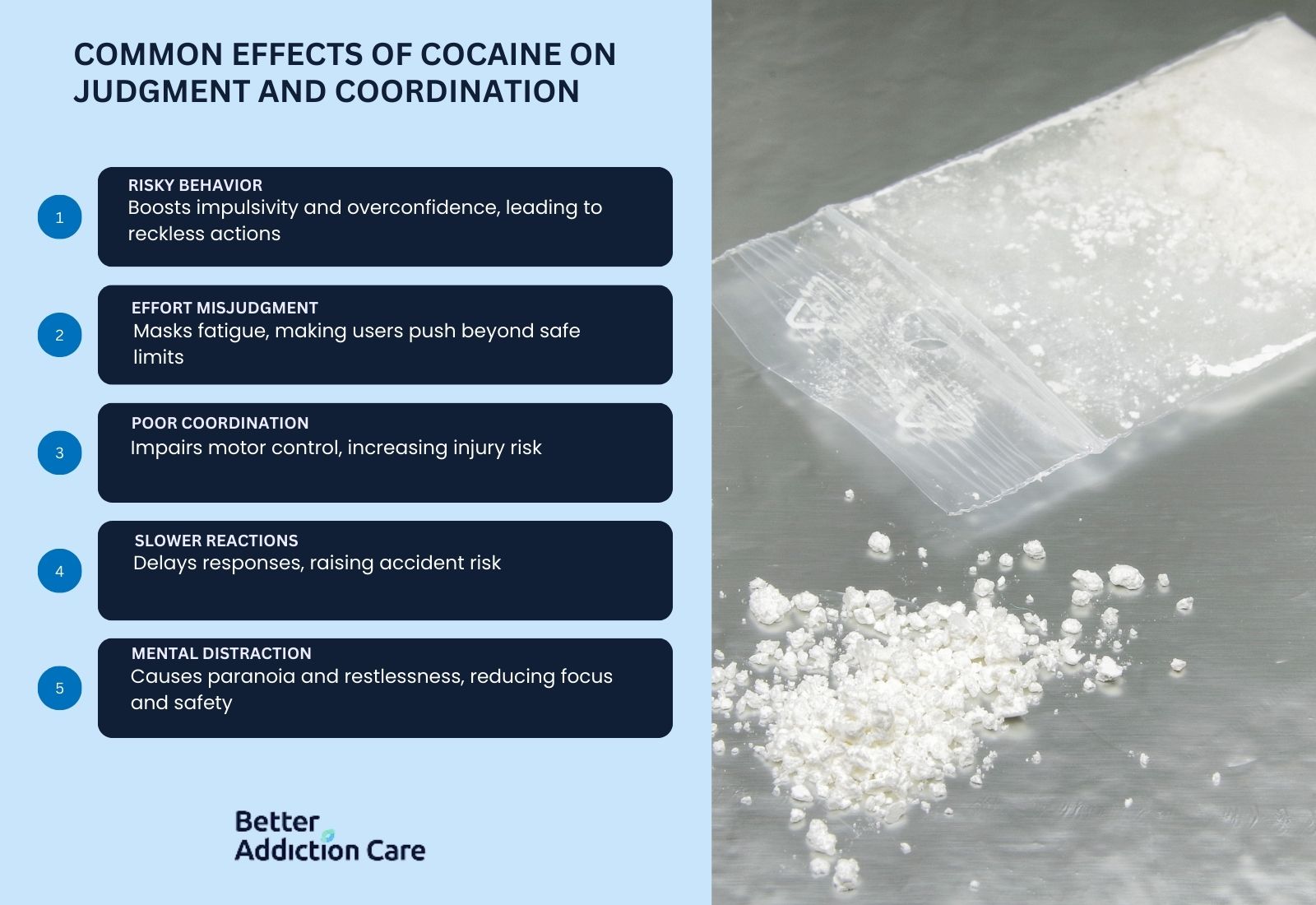
The effects of cocaine on judgment and coordination include impaired decision-making abilities, decreased motor control, heightened risk behaviors, distorted self-perception, and slowed reaction times. These alterations in normal brain function significantly impact daily functioning and safety, putting users at greater risk for accidents and injuries.
The common effects of cocaine on judgment and coordination are:
- Increased Risk-Taking Behavior: Cocaine intensifies sensation-seeking, impulsivity, and overconfidence, leading to reckless actions. Reduced anxiety and fear levels result in behaviors that individuals would typically avoid.
-
Distorted Perception of Effort and Fatigue: Cocaine alters the perception of effort and tiredness, making individuals feel more energetic and less aware of their physical limitations during exercise.
-
Impaired Motor Coordination: Cocaine use reduces fine motor skills and coordination, causing tremors, muscle spasms, and balance issues. These effects increase the likelihood of accidents, falls, and injuries during activities requiring precision and quick reflexes.
-
Decreased Reaction Time: Cocaine slows reaction time, hindering the ability to respond quickly to unexpected stimuli or changes during exercise. This delay raises the risk of accidents, collisions, or injuries, especially in high-intensity or fast-paced workouts.
-
Psychological Distress: Cocaine induces restlessness, nervousness, and paranoia, which worsen during exercise. Intense tension, impatience, and difficulty focusing impair attention to form, technique, and safety measures while working out.
How Does Using Cocaine For Workouts Affect Self-esteem?
Using cocaine for workouts negatively affects self-esteem by initially providing a false sense of confidence, but ultimately leading to a damaged self-image and diminished self-worth. This unhealthy coping mechanism exacerbates feelings of guilt, shame, and insecurity, resulting in social isolation, deteriorating relationships, and declining physical and mental health, creating a destructive cycle of addiction and negative self-perception.
Does Working Out on Cocaine Have Legal Consequences?
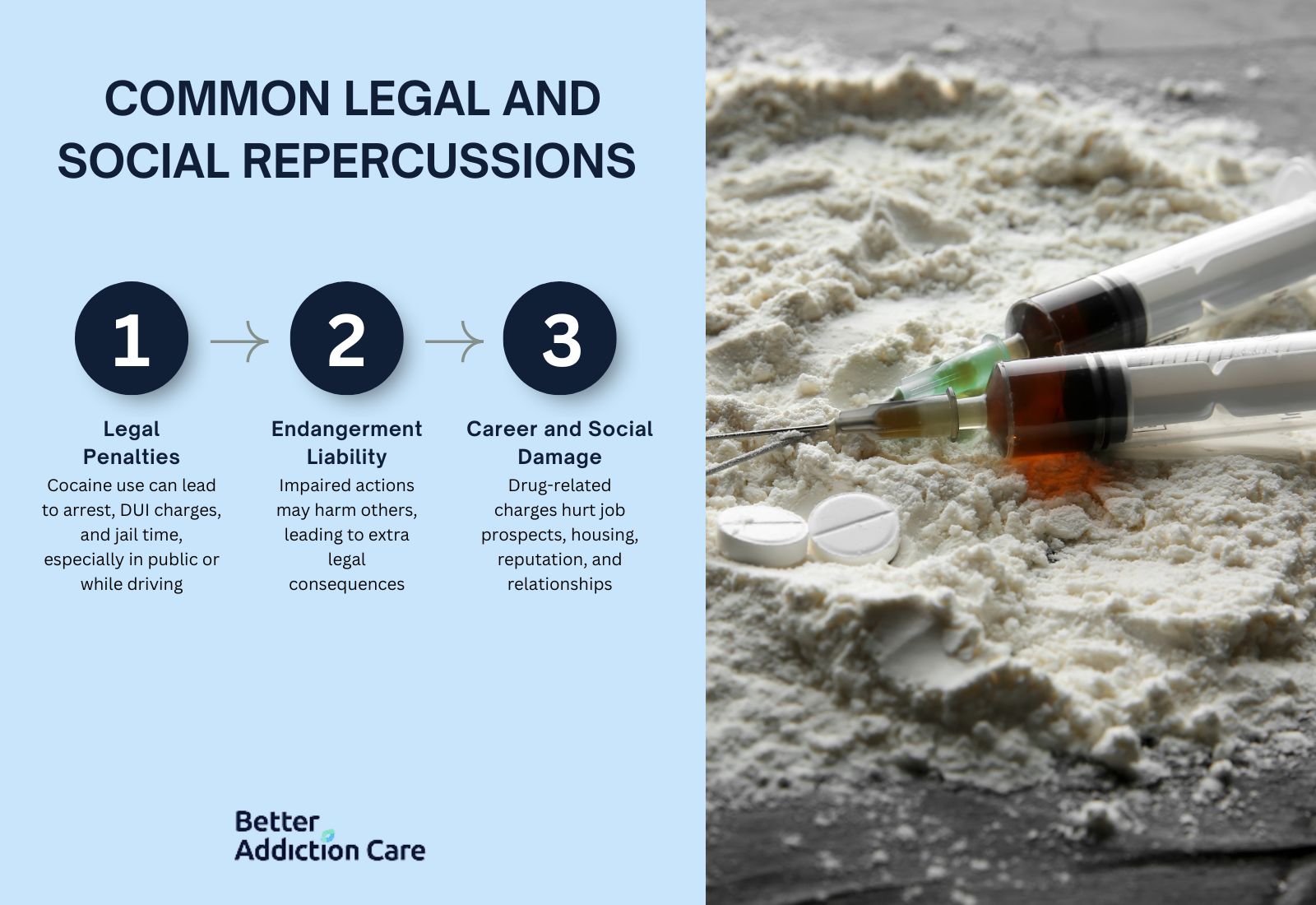
Yes, working out on cocaine has serious legal consequences.
The legal consequences of working out on cocaine include arrest, criminal charges, substantial fines, imprisonment, heightened risk of detection in public fitness spaces, potential DUI charges when traveling to or from the gym, legal liability for endangering others, damage to professional standing, and long-term effects on employment opportunities. Working out while under the influence significantly increases your visibility to authorities and creates dangerous situations that compound legal troubles.
Here are the common legal and social repercussions:
-
Legal Penalties: Possessing, using, or selling cocaine is illegal in most jurisdictions. Getting caught with cocaine results in arrest, criminal charges, fines, probation, or imprisonment. Working out in public spaces while under the influence increases your risk of detection. Additionally, traveling to or from your workout while impaired leads to DUI charges, license suspension, and other severe penalties.
-
Endangerment Liability: When you work out on cocaine, your impaired judgment and coordination endanger others around you. This leads to additional legal charges if you cause accidents or injuries, particularly in shared gym spaces, fitness classes, or team sports where others rely on your coordination and awareness for safety.
-
Professional and Social Consequences: Legal troubles stemming from cocaine use while working out seriously impact your professional career, reputation, and relationships. Many occupations require background checks and prohibit employment for individuals with drug-related convictions. These legal records follow you for years, affecting housing opportunities, professional licensing, and social standing.
What Are The Main Treatment Options For Cocaine Addiction?
The main treatment options for cocaine addiction include inpatient rehabilitation (residential care with 24/7 support), outpatient programs (flexible therapy while living at home), medically-supervised detoxification to safely manage withdrawal, and evidence-based therapies like Cognitive Behavioral Therapy (CBT) and Contingency Management. Most effective treatment plans combine multiple approaches, such as individual counseling, group therapy, and ongoing aftercare support. A local drug rehab facility can evaluate your specific situation and recommend the most appropriate combination of treatments based on your addiction severity and personal circumstances.
How Can A Local Drug Rehab Facility Help With Cocaine Abuse?
A local drug rehab facility helps with cocaine abuse by providing specialized treatment programs designed to address both the physical and psychological aspects of cocaine addiction. These facilities offer medically supervised detoxification to safely manage withdrawal symptoms, followed by evidence-based therapies like Cognitive Behavioral Therapy (CBT) and Contingency Management that specifically target cocaine use patterns. Individual and group counseling sessions address underlying issues that contribute to addiction while teaching coping mechanisms to prevent relapse.
Professional staff at these centers create personalized treatment plans tailored to each patient's unique circumstances and severity of cocaine dependence. They provide a structured environment away from triggers and access to substances, which proves crucial during early recovery.
The recovery journey becomes more successful when patients utilize local drug rehab facilities that offer essential aftercare planning and ongoing support services. These include regular check-ins, alumni programs, and connections to community resources. Many facilities additionally address co-occurring mental health conditions that frequently accompany cocaine addiction, ensuring comprehensive treatment that tackles all aspects of substance use disorder.


